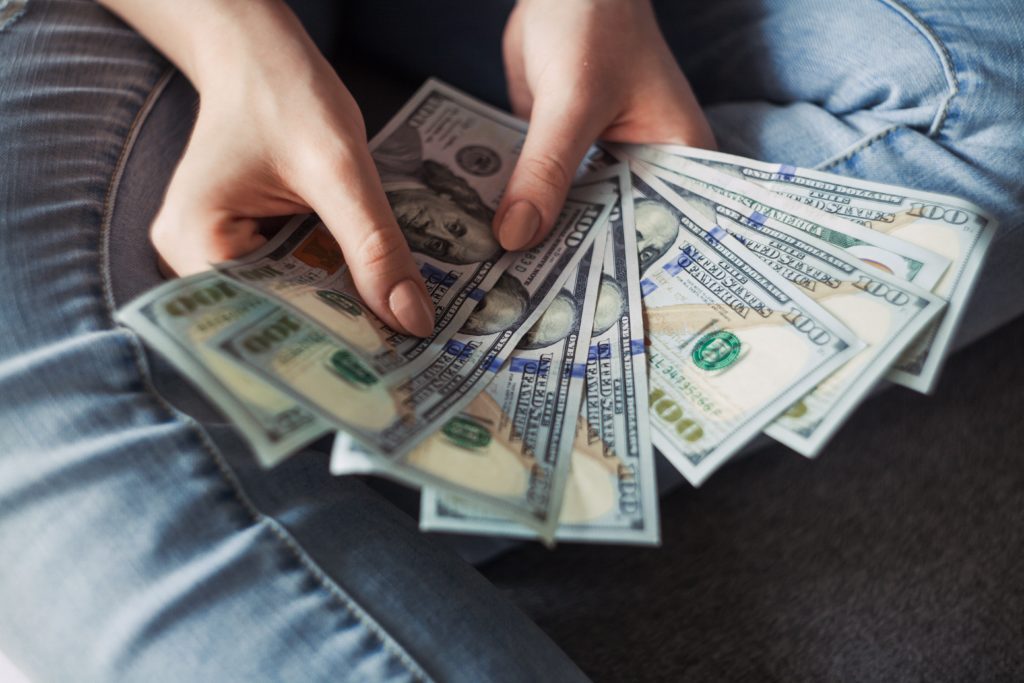Arriving on this planet, I lucked into a Bania family, the financial maestros of India—basically the money wizards. It’s like being born into the Jedi Order, but with calculators instead of lightsabers. I sometimes wonder if my first words were “compound interest”. We’re so money-minded; even our dreams have price tags! We don’t count sheep to sleep; we count profits! It’s a world where even the tooth fairy leaves stock options under your pillow.
Out of the vast pantheon of 330 million gods and deities in Hinduism, can you take a wild guess at their favorite? No surprises here—Goddess Lakshmi takes center stage. Known as the divine embodiment of wealth, fortune, and prosperity, Lakshmi is the beacon of abundance. Does the mere mention of her name truly capture her essence? Perhaps not. Allow me to share a few stories that might offer deeper insights.
Wheat, Weight, and Woes
As was the norm in India, my dad would routinely buy raw wheat in bulk, filling up 15 kg tin canisters. His math was meticulous, always calculating with precision. “20 paise per kg. This is 15 kg. 15*20=300. Here, take 3 Rupees and get this milled,” he’d say. He would then load the canister on my tender shoulders like I’m a peasant’s son and I’d haul that load for about a kilometer without any incentive in return. However, unlike other fathers who might say, “Here son…get this done and keep the change,” my dad’s heart was frugal. There was no room for keeping the change in his transactions. His calculations were usually flawless, until an unforeseen change altered the equation.
“15 kg. That’d be 3 rupees and 75 paise,” Kakka-ji, the heartless miser from the same Bania community who owned the grain mill, declared as he weighed the canister on the balance.
“But dad said it would be 3 rupees for 15 kg,” I protested, shocked to see my father’s pre-calculation fail.
I was wrong about that. A Bania’s calculation never fails; circumstances do.
“The milling rate has changed. It’s 25 paise per kg now,” Kakka-ji grumbled as he dethroned the canister from the balance.
Frantically, I checked all five of my pockets—two on my shirt, two in my pants, and one secret pocket that was always sewn into the inner side of my pants. In our family, the concept of pocket money or allowance was nonexistent, so there was no chance I had a spare paisa. I merely pretended to search for non-existent money in my pockets, attempting to conceal my destitution.
“I think I forgot to bring extra money. Is it okay if I give you the remaining balance later?” I asked. In response, Kakka-ji, without uttering a word, pointed his finger to a giant signboard hanging by his desk.
“Aaj Nagad Kal Udhaar,” it read, which literally translates to “Cash today, Credit tomorrow.”
I felt like punching myself in the face for posing such a vain question to another Bania. What was I thinking?
Summoning every ounce of strength, I hoisted the hefty canister back onto my shoulder, its sharp edges grating against my collarbone. Painful? Let’s just say my collarbone begged for a truce.
As I trudged back home, canister in tow, I pondered the meaning of life, or more precisely, why my dad thought it was acceptable to turn me into a mini freight carrier. Clear instructions echoed in my head: “Never, ever abandon the canister at Kakka-ji’s mill, or risk a sneaky wheat swap for some low-grade substitute.” The struggle was real, and so was the threat of subpar chapatis.
“The milling rate has changed. He wants an extra 75 paise!” I reported bitterly to my dad, my shoulder still aching.
“That rapacious bastard! He hikes the rate at will! I should open my own grain mill,” my dad thundered in outrage. He sneaked his hand into the right pocket of his pants, pulled out some coins, and began counting.
“Why can’t you just keep some spare money in my pocket so I don’t have to make rounds?” I confronted him.
My dad looked at me as if I were the prodigy of foolishness, someone who did not understand the essence of being born in the proud community of Banias. “Someday, you would understand, son. Someday,” he sighed.
Little did I know, this mysterious “someday” would become the elusive unicorn of my existence, a phrase muttered whenever the perplexities of Bania wisdom left me scratching my head. And so, I waited, patiently, for the day when the cosmos of Bania secrets would unfold before me once again.
Coin Chronicles
My dad often assigned me the noble task of depositing the quarterly installments for the only savings he had—a life insurance policy. In our household, we shared a single bicycle, and if someone had already taken it out, the rest of us had no choice but to wait or resort to walking.
On one such day, my brother had taken the bicycle when my dad approached me almost pleadingly. “It’s the last day to deposit the installment, and the office closes in an hour. Take this money and run to the office,” he implored, pressing 426 rupees and 70 paise into my palm.
“But bhai has claimed the bicycle, and the office is nearly 2 kilometers away!” I protested, expecting a sympathetic retreat.
“Yes. That’s why I asked you to run,” he smirked. It was summer, and the heat was unbearable for walking, let alone running.
“What a sadist father I have!” I fumed internally as I looked up at the scorching sun. Of course, I kept that thought to myself; saying it aloud risked being left in a state of pulp.
With no other option, I sprinted the entire distance, reaching the office in less than fifteen minutes. As I entered, I found a queue of procrastinators, all united in their mission to make last-minute deposits.
That didn’t bother me much, though, as standing in line was a far cry from sprinting in the blistering heat. The office had air conditioners, offering a welcome respite as I cooled down in the pleasant breeze. After a brief wait, it was my turn at the counter. I swiftly pulled out the money from my secret pocket and spilled it at the counter, along with two coins—a fifty-paisa coin and a twenty-paisa coin.
The cashier, upon seeing the coins, stopped counting money. “What is this?” he asked.
“Insurance installment.” I replied innocently.
“I know that. But what is this?” he repeated his question, pointing towards the coins.
“70 paise,” I replied, suspecting nothing wrong.
“Don’t you know that the government has discontinued the 10 paise and 20 paisa coins?” The cashier disdainfully highlighted my lack of awareness of current affairs.
“Come on, I’m just a kid, not even in my teens yet. How does he expect me to be up to date with the policies of the government?” I thought.
“Oh, I don’t know about that, but this is all I have,” I replied, hoping for clemency.
“This won’t work. You need to get a 25 paisa coin,” he insisted, rejecting the deposit.
“What a grumpy old man!” I thought as I picked up my cash and bolted. It was a race against time since the office was closing in about thirty minutes.
My dad was counting coins when I barged into the room.
“Don’t you know that the government has discontinued 10 paisa and 20 paisa coins?” I hurled the same question at him that the cashier had used to demean me.
“Yeah. So what? They sent a bill of 426 rupees and 70 paise. So, they must accept the coins!” he insisted, showing no remorse whatsoever.
“Oh yeah? Why don’t you go and try your luck then?” I yelled.
My dad went into a contemplative mode for a few seconds, probably gauging the temperature outside as soon as I said that.
“Never mind. Here is the 25 paisa,” he said compassionately, flipping the coin towards me.
“Please, God, send someone to adopt me,” I petitioned, of course, in my head again.
I swear I must have broken all existing sprinting records that day. I sprinted even faster this time, surpassing my previous record to reach the office just two minutes before closing time. I was the last person to make a deposit that day.
Exhausted, I returned home after completing the task. My dad was still counting coins.
“Why do you do this to me?” I almost wailed.
“Someday, you would understand, son. Someday,” he sighed melodramatically, his conviction surpassed only by Bollywood actors.
It took me years to discover that he used this catchphrase not just with me but with my brother as well. This was his way of acknowledging “I’m clueless as hell” in situations where he had no answer or justification.
We had no concept of pocket money or allowance. I didn’t even know anything like that existed. In fact, my first realization came when I saw my school friend’s dad hand him a 1-rupee coin, saying, “This is your pocket money for today.”
“A whole rupee???” I exclaimed. “Just for today???” I could buy my entire bucket list with that kind of money, only if I had any.
There were no birthday cakes either, only homemade gajar halwa (a dessert made of scraped carrots boiled in milk) or gulab jamuns.
“What’s wrong with that? After all, you need only some sort of sweets to celebrate,” was my dad’s argument to justify his money-saving tactic.
My mom made ghee at home, and cottage cheese, and khoa, and whatnot—all according to my dad’s instructions. The reason? “There is too much adulteration outside,” he’d say.
I don’t know if that was the real reason, but I liked the idea anyway. Not because it saved us from adulteration (the least of a concern for a kid) or saved money, but for the leftover milk residue, almost burnt, that my mom used to make toffees. Surprisingly, it tasted just like Coffee Bite, the favorite toffee of me and my brother!
Pedals to Petrol
The 10th standard in school is a bit of a mixed bag, a time when you’re sometimes treated like a kid but feel like you’re on the cusp of adulthood and vice versa. Right after I wrapped up my 10th grade, my school pals were flaunting their newfound swagger on scooters or bikes, gifts from their dads for conquering the 10th-grade summit. Meanwhile, there I was, the school topper and second in the whole district, still pedaling away on the same old bicycle we all pitched in for—now with the extra task of oiling its chain every other week to stave off the relentless march of rust.
Honestly, I hadn’t mustered the enthusiasm to request a shiny new bike from my dad because I could practically predict his response. But when the peer pressure became too much to bear, I, without a shred of pride, tossed my resolution aside and approached him one day.
“Everyone’s zipping around on Bajaj scooters or Splendors, and I’m exhausted dragging this piece of junk! Could you at least get me a Hero Puch?” I pitched my request for a moped, pre-bargained in my head—after all, proposing a scooter or a bike would have been a guaranteed denial.
“What? It’s 14,000 rupees! Are you out of your mind? It’s too expensive!” He swiftly shot down the proposal.
I wished he could’ve witnessed my friends astride bikes worth more than double the price tag of a Hero Puch before branding it as expensive.
“Alright, how about a Luna then?” I tried my luck, further downgrading my plea to a pedal-driven moped that was almost half the price of my initial request, which was still more than half the price of the bikes my friends were cruising on!
“Son…,” I was prepared to sprint to an orphanage if he pulled out his perennial catchphrase, “someday you would understand” one more time.
“God has given you two legs. Do you know why?” He paused, completing the statement with a poker-faced delivery.
I didn’t know how to react. Luna and Hero Puch were momentarily forgotten, and I was more dumbfounded by how he could conjure this up so quickly.
“Goddamn Banias…must be in the genes!” I muttered to myself as I left the room, shaking my head in despair.
A few days later, though, he did buy a new bicycle—not because I demanded a bike or a moped, but because the shared bicycle was already crumbling to death!
One of the most shocking days of my childhood, etched in my memory, is when my dad gifted me a watch. It was a basic digital watch, but considering his spending standards, I assumed he must have spent a fortune.
I was so thrilled that I wore a half-sleeve uniform for school in winter for several days just so my schoolmates could catch a glimpse of my brand-new digital watch! The excitement took a hit when, one day, the watch stopped working. I couldn’t see anything on the display, and my heart sank.
“Dad, look! It stopped working. It’s not even a week, and the display is gone!”
“Take it to Prakash Electronics and ask him to replace it with a new one.”
“Okay. And where is the bill? I’m sure he would ask for it.”
This is when my dad took a pause. I guess he had just realized something.
“Tell him it’s the free gift with the Kelvinator fridge we bought from him,” he said.
I was stunned at the revelation.
Say what you will about my dad’s love for money, but when it came to education, he left my friend’s dads in the dust. I never heard a no from him whenever I needed a book, stationery, or even exam forms.


